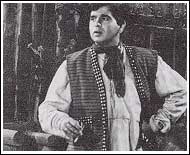
HOME | MOVIES | FEEDBACK |

Dinesh Raheja
On a superficial level, Naya Daur may seem like an anti-machine Luddite screed, with its poor, tonga-riding protagonist winning an all-important race against the rich bus-riding capitalist.
But B R Chopra's rustic, heart-in-its-right-place classic aims not to denigrate, but highlight the sometimes overlooked human cost of progress.
Naya Daur may not come up with the perfect solution to the eternal struggle between the moneyed and the labourers, but 45 years later, the humanist issues it raises remain just as timeless and urgent.
In true Chopra fashion, the fable is salted with several absorbing intricacies --- an estranged friendship (Dilip Kumar-Ajit), gung-ho team spirit (an entire village joins hands) and a troubled but deeply abiding love story (Dilip-Vyjayanthimala).
The film opens with an almost idyllic village which hums to the daily rhythms of its two biradaris --- the woodworkers employed at the mill and the tangewallahs. The mill owner is a benign presence and all is well with the world, giving exuberant tangewallah Shanker (Dilip Kumar) ample time to flirt outrageously with village Venus Rajni (Vyjayanthimala). While on a tonga trip, he even cheekily asks her to join him on the front seat as the tonga is lopsided. Shanker's best buddy Krishna (Ajit) is as bedazzled by Rajni.
Soon, the benign mill owner leaves on a pilgrimage and son Kundan (Jeevan) arrives, brimming over with ideas to boost profit figures. He installs a new machine in the mill and summarily fires most of the workers.
Left without a source of livelihood and options, the villagers start emigrating from the basti.
Meanwhile, some heckles raising chauvinism on the two friends' part gives rise to further problems. Shanker and Kishen realise the other loves Rajni too. They solve the dilemma by agreeing that Rajni would be wed to one of the two depending upon the flowers she profers at the mandir. Shanker's sister Manju (Chand Usmani), who is secretly in love with Kishen, switches the flowers; Kishen sees her and angrily assumes that Shanker has enlisted her help.
The friends part ways amid bitterness. On the vengeful Kishen's advice, Kundan now gets a passenger ferrying bus to the village and that instantly impacts Shanker and the other tangewallahs' source of income. A cocky Kundan agrees to withdraw the bus if, three months later, Shanker's tonga manages to win in a race against the bus.
Shanker accepts the gauntlet. A reconciled Rajni is the first to support him and help him shepherd the reluctant villagers into enlisting their help for the common cause. With their help, Shanker decides to build a new road that would prove a shortcut for his tonga.
Kishen and Kundan try every trick to foil their plans but fail. Finally, Kishen's misunderstanding is cleared and it requires no great powers of prescience to predict who wins the race in the rah-rah finale.
The climactic tonga versus bus race is not as technically accomplished as the chariot race in Ben Hur, but the seeping shots of cheering crowds make it emotionally involving.
Thankfully, director B R Chopra takes pains to point out in his film that his characters are not anti progress. In the climax, the mill owner reprimands his son Kundan, "Tumne sahi kaam galat tareeke se karna chaha."
Shanker too states, "Humko machine se koi ber nahin." Earlier too, he asks Kundan to work out a way whereby, "Aapki jeb bhi bharti rahein aur gareebon ka pet bhi."
Besides its plea to consider the fate of those displaced by the unrelenting march of progress, Naya Daur also appeals because it is a fine example of the triumph of the human spirit when pitted against seemingly-insurmountable odds.
The film does lapse into Utopianism and wishful thinking. One sore thumb is journalist Johny Walker, who champions Shanker's cause and prints his story in several newspapers and in different languages.
Dilip Kumar holds the film together. He brims over with roguish rusticity and sheer ebullience, yet in sharp contrast, effectively underacts in the scene where he thinks Vyjayanthimala is dead.
Vyjayanthimala too is not your average petulant gaon ki gori. She ably projects a hands-on worker who comes up with ideas on how to ford a stream and risks her life to save the bridge.
Dilip and Vyjayanthimala's together scenes are characteristically unique. Hurting for his friend, an angry Dilip rebuffs her saying that if he had known it would affect his friendship, he would have never looked at her. A devastated Vyjayanthi with stricken eyes says, "Itna toh mat girao. Main apna mol jaan gai hoon."
It is a wonderful scene between two stars whose chemistry is undeniable.
Sidelights:
* The beauteous Madhubala was originally supposed to do Vyjayanthimala's role. But her father flatly refused to let her leave for outdoor shoots. B R Chopra replaced her and it led to an acrimonious court case.
* Ajit, the famous villain of the seventies, was a saleable 1950s hero, opposite A-listers like Meena Kumari, Madhubala and Nalini Jaywant. Ajit went on to be seen as Dilip Kumar's friend in another classic, Mughal-e-Azam.
The Music:
* The O P Nayyar wave crested in 1957 with his twin successes in Naya Daur and Tumsa Nahin Dekha. He shot to the top. But strangely, this was his only film with Chopra and Dilip Kumar.
* Sahir Ludhianvi joined B R films with Naya Daur and stayed on for the next two decades.
* Nayyar's trademark tonga song was present in Naya Daur in Maang ke saath tumhara.
* While Nayyar remembered old favourite Shamshad Begum for Reshmi salwar, Naya Daur was Asha Bhosle's major break where she was singing all the heroine's songs. It decisively catapulted her to the major league.
You might also want to read:
|
|||||||||
© 1996 - 2002 rediff.com India Limited. All Rights Reserved. |
||||||||||